Bathroom Remodeling in Delmarva:
What Homeowners Need to Know Before Starting
Imagine stepping into a spa‑like bathroom every morning — warm light, elegant fixtures, and everything exactly where you need it. For many Delmarva homeowners, remodeling the bathroom is one of the most rewarding home projects. But before you start tearing out tile or shopping for vanities, there’s one thing to know: successful bathroom remodels start long before demolition day.
In this guide, I’ll walk you through what Delmarva homeowners should know before starting a bathroom renovation — from budgeting and permits, to plumbing upgrades and local style trends. I’ve included current statistics, expert insights, and reputable links so you can plan with confidence.
Planning Your Bathroom Remodel
1. Return on Investment
Bathroom remodels consistently offer one of the highest returns for homeowners. According to the Remodeling 2024 Cost vs. Value Report, a mid‑range bathroom remodel has an average ROI of around 70%, meaning much of your investment comes back in resale value.
2. Comfort & Functionality
For those not selling anytime soon, a remodel improves daily comfort. The National Association of Realtors Remodeling Impact Report gave bathroom renovations a 9.6 “Joy Score” — one of the highest ratings for homeowner satisfaction.
3. Solving Existing Issues
Older Delmarva homes may have hidden problems: slow drains, leaking pipes, poor ventilation, or mold. Remodeling is the perfect time to address these issues with professional plumbing services (Roto‑Rooter Delmarva Plumbing) so you’re not repairing damage later.
Why Remodel Your Bathroom?
Set a Realistic Budget
Costs vary by size, scope, and materials:
Small updates: $8,000–$15,000
Mid-range remodel: $20,000–$30,000
High-end or luxury remodel: $35,000+
(Source: Remodeling Magazine)
Always include a 10–15% contingency for surprises (common in older Eastern Shore homes).
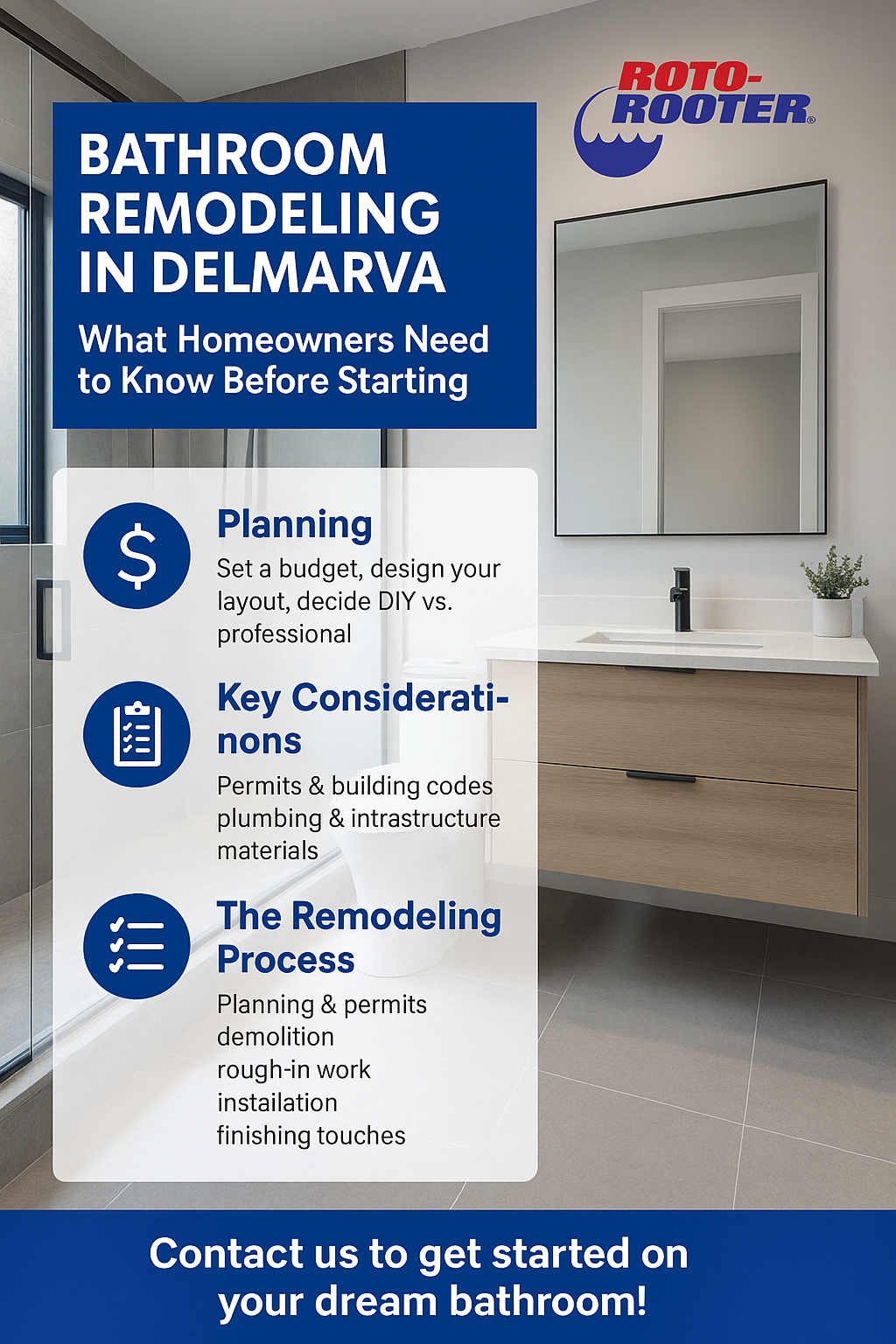
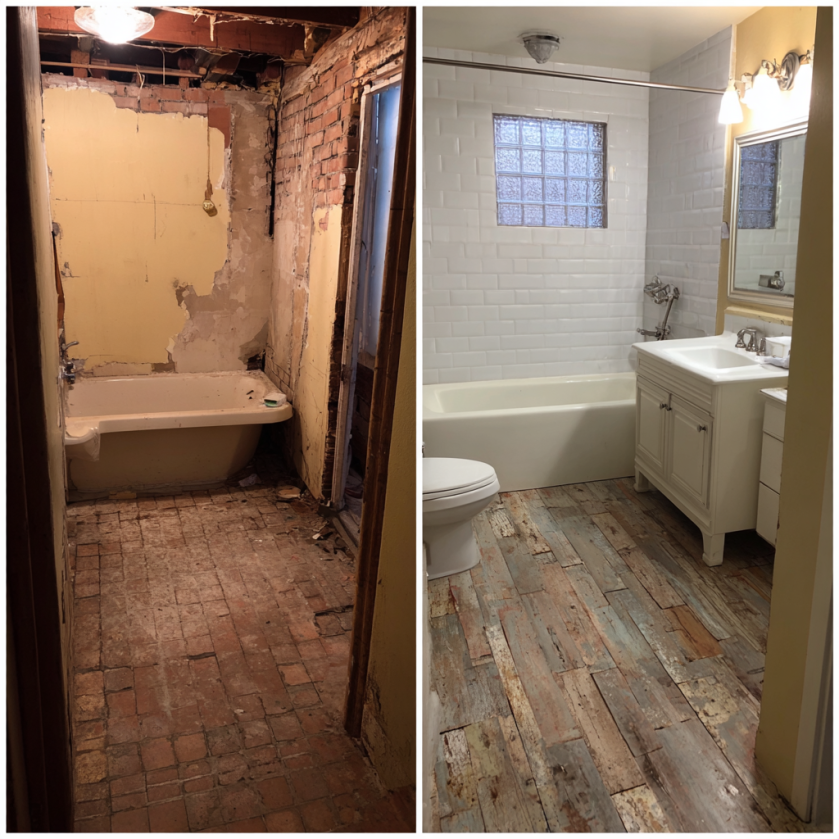
Always include a 10–15% contingency for surprises (common in older Eastern Shore homes).
Design Your Layout, Think about:
Traffic flow & storage
Shower/tub preferences (walk‑in vs traditional tub)
Lighting (ambient, task, accent)
Style (Delmarva coastal blues, or timeless neutrals)
DIY vs. Professional
Painting or hardware swaps can be DIY, but plumbing, electrical, and waterproofing should be done by licensed professionals to meet Delaware & Maryland building codes.
Key Considerations Before You Start
Permits & Building Codes
Most remodels involving plumbing relocation, electrical changes, or structural modifications require permits.
Check with your local county:
- Delaware Permit Information
- Maryland Permit Information
Skipping permits can cause issues during resale or insurance claims.
Plumbing & Infrastructure
Behind the tiles is the heart of your bathroom: the plumbing system.
- Replace galvanized or cast iron pipes prone to corrosion.
- Ensure water pressure supports new features like multi‑head showers.
- Consider a water heater upgrade if installing large tubs or multiple shower heads. (Water Heater Services)
- Perform a sewer line inspection before closing walls (Sewer Line Video Inspection).
Material Selection
Choose moisture‑resistant materials for Delmarva’s humid coastal climate:
- Flooring: porcelain tile, luxury vinyl plank (LVP)
- Walls: cement backer board in wet areas
- Fixtures: corrosion‑resistant faucets & hardware
Energy & Water Efficiency
According to the EPA WaterSense Program, replacing outdated fixtures can save up to 10,000 gallons of water per year per household.
- Install 1.28 GPF toilets
- Use low‑flow showerheads (2.0 GPM or less)
- Add LED lighting & humidity‑sensing fans
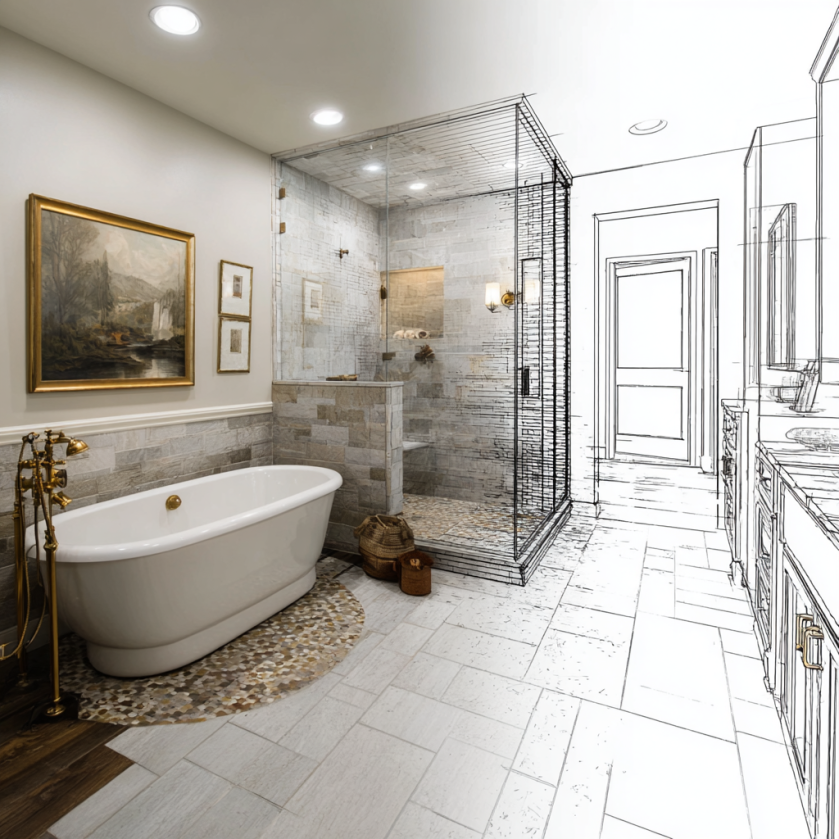
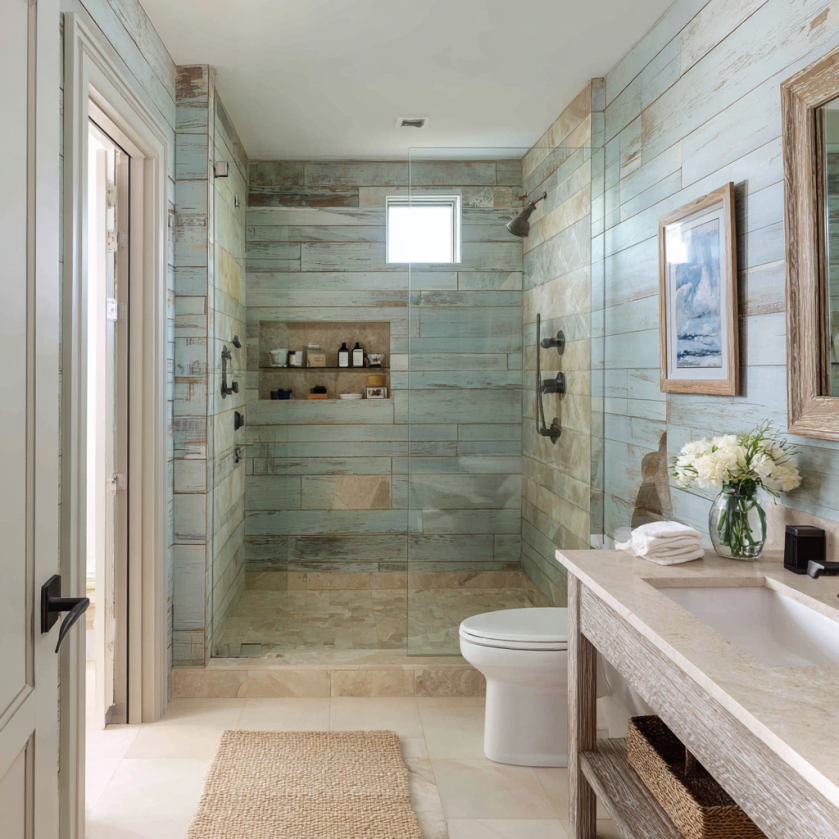
The Bathroom Remodeling Process
Step 1 – Planning & Permits
Finalize layout, order fixtures early, and secure permits. This stage prevents delays during construction.
Step 2 – Demolition
Old fixtures, tile, and drywall are removed. If it’s your only bathroom, arrange temporary accommodations.
Step 3 – Rough‑In Work
Plumbing and electrical lines are updated. Inspections ensure code compliance before closing walls.
Step 4 – Installation
Drywall, tile, flooring, shower/tub, vanity, and fixtures are installed. Proper waterproofing is essential.
Step 5 – Finishing Touches
Painting, caulking, and trim work complete the project. A final walk‑through addresses any punch‑list items.
Timeline:
- Small remodel: 1–2 weeks
- Full remodel: 3–8 weeks
Popular Trends in Delmarva Bathrooms
Coastal & Contemporary Designs
- Light blues, sandy neutrals
- Shiplap walls, driftwood finishes
- Frameless glass showers for a modern touch
Accessibility & Aging‑in‑Place
- Curbless walk‑in showers
- Grab bars (stylish options available)
- Comfort‑height toilets
- Walk‑in tubs
Luxury Features
- Rainfall showerheads
- Heated flooring (ideal for cold winters)
- Double vanities
- Smart mirrors with anti‑fog and lighting controls
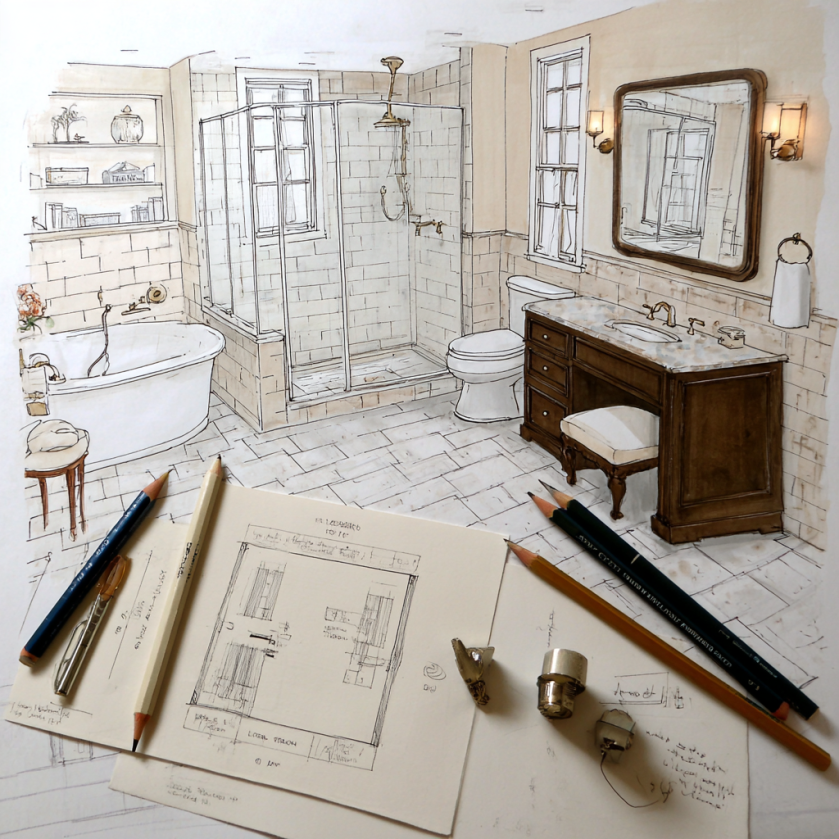

Conclusion – Bringing Your Dream Bathroom to Life
A bathroom remodel in Delmarva is more than an upgrade — it’s an investment in your home’s value and your daily comfort. With proper planning, attention to permits, and expert help for plumbing and installation, you can create a bathroom that serves you for decades.
At Roto‑Rooter Delmarva, we don’t just handle plumbing — we help homeowners create bathrooms built to last. Whether you’re upgrading a small guest bath or a master retreat, our team ensures every fixture, pipe, and detail meets the highest standards.
Ready to start your bathroom remodel? Contact Roto‑Rooter Delmarva today for a consultation.
